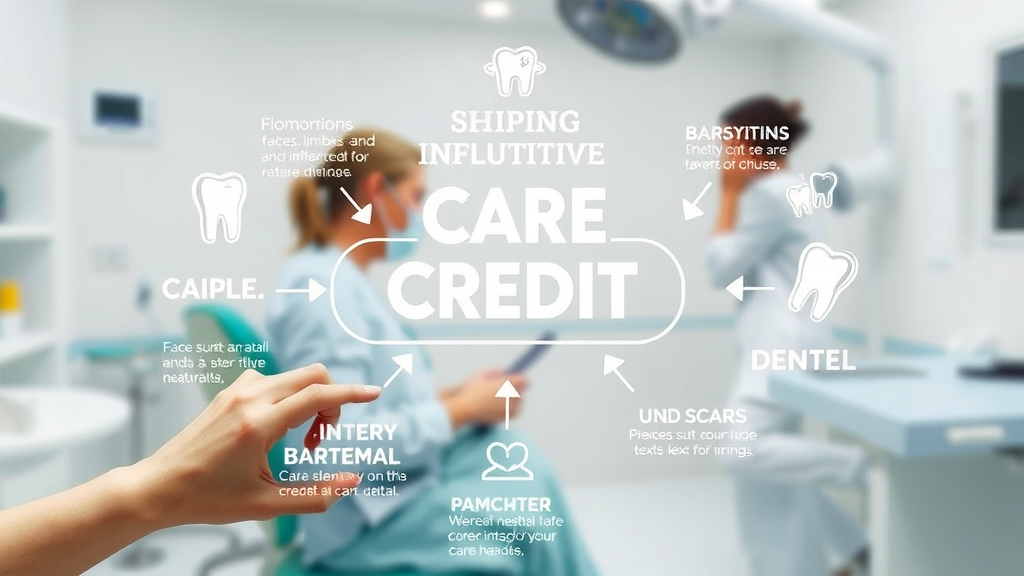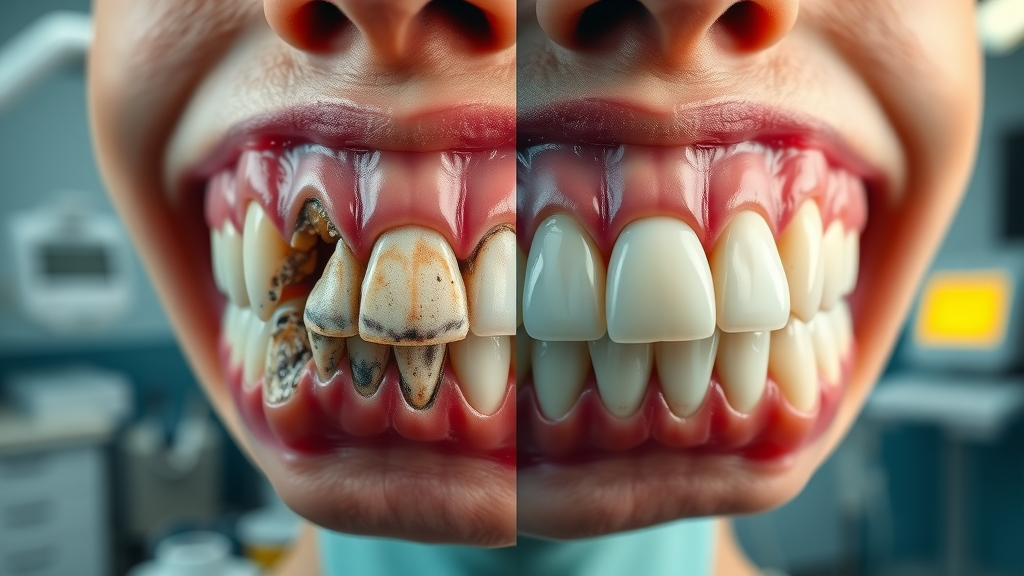An astonishing number of Americans face budget constraints when seeking necessary dental care.
Understanding Care Credit for Dental Care
What is Care Credit?

Care Credit is a specialized credit card designed to assist individuals in paying for medical, dental, and veterinary expenses. It acts as a financing option that enables patients to spread out healthcare costs over a set period, making it easier to manage expenses without the need for immediate upfront payments. Unlike traditional credit cards , Care Credit specifically focuses on health and wellness , allowing payments to be made on a variety of dental care procedures.
How Does Care Credit Work for Dental?
When utilizing Care Credit at the dentist's office, the overall procedure is straightforward. After discussing your treatment plan with your dentist, you can apply for a Care Credit card, usually within the clinic or via their website. Upon approval, you can use the card to cover costs for various dental services . Care Credit offers flexible payment plans with promotional financing options , allowing patients to pay in smaller, more manageable monthly installments. These options can include interest-free periods or fixed interest rates, depending on the plan selected and credit profile.
|
|
|
Comparison of Care Credit vs. Traditional Payment Plans |
|
|
Care Credit |
Traditional Payment Plans |
|---|---|---|
|
Flexibility |
Highly flexible, with various plans available |
Limited flexibility |
|
Interest Rates |
Variable; often offers promotional rates |
Fixed, often higher rates |
|
Monthly Payments |
Customizable based on chosen plan |
Fixed monthly payments |
The Benefits of Care Credit in Dental Health
Flexible Financing Options for Patients

One of the primary advantages of Care Credit is its flexibility in financing options . It provides patients the ability to pay for necessary dental procedures such as root canals and orthodontic treatments in ways that suit their financial circumstances. Care Credit offers promotional financing that can include interest-free periods if paid in full within a predetermined time frame. This enables significant budget relief, particularly for unexpected dental emergencies.
Promotional Financing Options Explained
Understanding promotional financing options is crucial for making informed decisions. These offers allow patients to avoid interest charges if the balance is paid within the promotional period, which can range from six months to two years. However, if the balance isn’t cleared within this time, interest is often applied retroactively, which underscores the importance of planning carefully and maintaining minimum monthly payments to avoid additional charges. These terms make dental care more accessible and enable patients to address their oral health promptly.
Exploring Dental Procedures Covered by Care Credit
Common Dental Procedures

Care Credit can be used for a wide range of dental treatments . Typical procedures covered include general dentistry operations such as cleanings and fillings, as well as more specialized practices such as orthodontics (braces), endodontics ( root canals ), periodontal treatments (gum disease), and oral surgery. This creates an opportunity for patients to receive comprehensive care without the burden of upfront costs, facilitating continuous health and wellness . For more information on preventing periodontal disease, visit our guide on periodontal disease prevention .
Cosmetic Dentistry and Care Credit
-
Teeth whitening
-
Veneers
-
Dental implants
-
Invisalign and other alignment aids
Beyond essential procedures, Care Credit also covers cosmetic dentistry , an often neglected aspect due to high costs. These procedures, aimed at enhancing the aesthetics of a smile, have become widely accessible, with patients opting for treatments such as teeth whitening, veneers, and dental implants. By financing these procedures, patients can pursue their ideal smile makeovers without delay. Learn more about our dental implant services in Hartford, OH.
How Care Credit Compares with Dental Insurance
Care Credit vs. Traditional Dental Insurance

The distinction between dental insurance and Care Credit is significant. While traditional dental insurance aims to cover a portion of the costs for preventive and essential dental care , it often comes with annual limits, waiting periods, and coverage restrictions. Conversely, Care Credit functions as a credit card specifically for healthcare, often covering treatments not included in insurance plans, offering flexibility and a direct financing option for patients wishing to avoid prolonged wait times for needed dental services . Ultimately, combining both can maximize benefits and minimize out-of-pocket expenses.
Ave Dental's View on Care Credit
'Care Credit opens numerous doors for those in financial dilemmas,' says Dr. Walsh of Johnstown Dental Care.
Johnstown Dental Care , like many clinics, embraces Care Credit due to its flexible financing options . This facility regards Care Credit as an empowering tool for patients facing financial restraints. It not only provides a gateway to immediate care but also supports individuals who might delay essential dental procedures due to budget concerns. This approach reinforces the clinic's commitment to patient-centered care.
Key Factors Influencing Care Credit Approval
Importance of Credit Score

Securing Care Credit is subject to credit approval , making your credit score a pivotal element. A higher credit score indicates reliability, improving the likelihood of approval and access to better terms such as lower interest rates. Individuals with scores on the lower spectrum should be mindful of repayments and work towards improving their credit to meet the lender's standards. Consistent and timely payments on existing credit obligations can gradually elevate your score, enhancing your financing prospects.
Potential Barriers and Cons of Care Credit
While Care Credit provides substantial benefits, there are potential downsides to consider. Interest rates outside promotional periods can be high, lessening the financial relief if payments aren't managed strategically. It's also important to note that missed payments can negatively impact your credit score , adding to financial strain. Patients must weigh these factors and consider their financial habits before committing to Care Credit, ensuring they can maintain minimum monthly payments to avoid additional costs.
Real-life Scenarios: Care Credit Testimonials
Patient Testimonial 1
"Thanks to Care Credit, I was able to afford braces for my teenage son without having to dip into our savings. The promotional financing was a lifesaver and made everything so manageable!"
Patient Testimonial 2
"I needed a root canal , and using Care Credit allowed me to undergo treatment immediately. The payment plans are a godsend for anyone needing urgent care without the funds upfront."

-
Testimonial A: A mother discusses how Care Credit facilitated her child's orthodontic care.
-
Testimonial B: A senior patient talks about accessing needed dental services in retirement.
-
Testimonial C: A young professional shares the ease of affording cosmetic dentistry.
FAQs on Care Credit
How does CareCredit work for dentists?
CareCredit works by allowing patients to pay for their dental treatments over time with a card that operates as a healthcare credit card. Dentists sign up with Care Credit to offer their patients flexible financing options , enhancing access to necessary treatments without large initial payments.
What are the cons to CareCredit?
While Care Credit offers flexible funding, the cons include high-interest rates post-promotional periods and potential negative effects on your credit score if payments are missed. It requires sound financial management to reap full benefits without incurring extra costs.
How much money can you get from CareCredit?
The credit limit for Care Credit varies based on the applicant's credit score and financial background. Generally, approval and limits are comparable to traditional credit card systems, accommodating a wide range of medical and dental procedures .
What credit score do you need for dental financing?
While there's no rigid baseline, scores of 620 or higher improve approval chances for dental financing. Applicants with lower scores may face challenges and should explore ways to enhance their credit history before applying.
Essential Takeaways and Conclusion
Key Benefits of Using Care Credit for Dental Procedures
Care Credit offers critical advantages such as expanded access to treatments, promotional financing options , and the ability to pay for substantial dental procedures over time without financial strain.
Final Thoughts on Dental Financing Options
Investing in dental health is now more accessible than ever with Care Credit.
As financing options like Care Credit become more mainstream, patients are empowered to prioritize their dental health and pursue treatments previously deferred due to cost constraints.
Contact Us for All Dental Financing Needs
Johnstown Dental Care 370 West Coshocton St. Johnstown, OH 43031
Phone: (470) 967-6046
Website: www.johnstowndentalcare.com
Proudly Serving:
Johnstown, New Albany, Granville, Alexandria, Pataskala, and surrounding areas in Licking County, Franklin County, and Delaware County.
 Add Row
Add Row  Add
Add 




Write A Comment